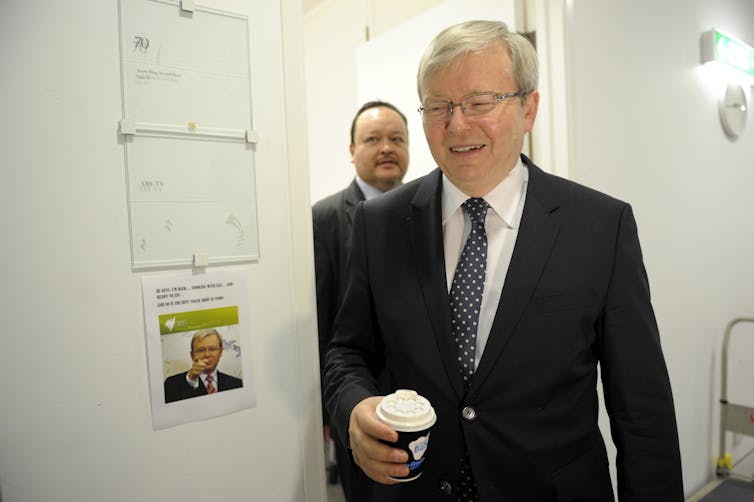
The tough debate looming within the government is between those urging Prime Minister Kevin Rudd to make an early dash to the polls and the “let’s just govern a while” school.
The political hard heads believe a late August election, while the voter “sugar hit” is at its height, is the best tactic to maximise the vote.
But Rudd himself is obviously relishing being back pulling the levers of power. He’s his old Energizer Bunny self - even if the bunny is more consultative these days.
Labor sources insist Rudd genuinely believes he can win the election - not just save some of the furniture.
Those, especially the newcomers, in the reshuffled ministry will almost certainly be on the side of waiting. If an Abbott government is on the cards they would like to ensure they are ministers as long as possible.
An early election would mean dropping the local government referendum, but today Tony Abbott broke the facade of bipartisanship, so that would be easy. The opposition says it should be pulled and most in Labor have no enthusiasm for it.
Rudd has made it clear he wants to abandon Julia Gillard’s September 14 date, and that he desires if possible to attend the early September G20 meeting in St Petersburg.
An October election would mean recalling parliament. That would give an opportunity to do some things but with the hung parliament would also be risky.
Going late pits the negative of things possibly falling apart against the positive of conveying the impressing of governing.
Business definitely does not want the election time pushed out. The Australian Industry Group’s Innes Willox told Sky that certainty about election timing was very important for business.
Business had got used to September 14 – if the government were to go beyond that it “would just cause another bout of uncertainty in the business community … We’d like to put September 14 as an end date for when an election could be”.
Treasurer Chris Bowen pointed out that uncertainty was the norm. “Of course the business community is always looking for certainty, and the Prime Minister has indicated he is abiding by the certainties of the traditional constitutional convention” which was that it was the PM’s call.
Nielsen pollster John Stirton believes that, in terms of the result, the timing doesn’t make much difference. “It’s in the final couple of weeks that the voters focus on the leader and the party that they want.”
Stirton says that when Bob Hawke displaced Bill Hayden in 1983 he got a poll boost but the result at the election (a few weeks later) had been close to what Hayden had been getting.
“When Rudd Mark 1 replaced Kim Beazley in 2006 he got a significant boost. In the final week of the 2007 election Labor’s vote returned to its pre-leadership change level. The point on timing is that it is the election itself that forces voters to make their final decision”.
While bets are hedged on election timing, Rudd today began the task of rebuilding relations with the corporate sector, meeting the Business Council of Australia, which is calling on the government to restore business and consumer confidence and urging an end to the politics of division.
The discussion canvassed growth, jobs and achieving a more productive and competitive Australia. The BCA had a list of concerns including the 457 visa legislation passed last week.
In a statement later the BCA said everyone had agreed to an “ongoing dialogue”.
Carbon pricing was on the BCA list not the focus.
But what Rudd does on carbon pricing is obviously important in government-business relations. Today he got support from the Australian Industry Group for bringing forward the change from the carbon tax to an emissions trading scheme.
Willox said a float earlier than the scheduled 2015 “would reduce business costs”.
“A trading scheme with a floating price is preferable to the [Coalition] direct action plan that’s currently on the table”, he said, while adding “it’s not an either-or proposition because direct action is still in development”.
Despite the qualification, it was a goal for Rudd over Abbott.
A faster move to an ETS would put a new burden on the budget, which is due to return to balance in 2015-16. Until it happens, however, Bowen is saying “I stand by the budget predictions”, which sounds just like the line we used to hear from Wayne Swan.
PS. Rudd today schmoozed more than business – he met Catholic schools authorities to discuss Gonski and did a well-photographed walk through the Parliamentary Press Gallery.
